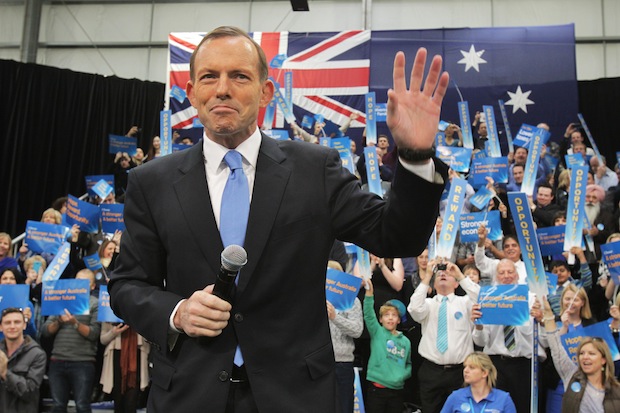By conventional wisdom, Tony Abbott should not become Prime Minister of Australia this weekend. He ought to be too conservative, a throwback to a bygone age. He is sceptical about global warming, and proposed to abolish a carbon tax on the grounds of its expense and uselessness. He is a churchgoer who is against abortion and is sceptical about gay marriage. He is a former boxer, who tends to back America in foreign policy disputes. He is an Anglophile and an enthusiastic monarchist. He ticks almost every unfashionable box in modern politics.
His victory is not inevitable, but those wishing to place money on his rival, Kevin Rudd, can find bookmakers willing to give odds of 26-1. The Australian Labor party, which enstooled Mr Rudd ten weeks ago, regarding him a charismatic Blair-style centrist, is facing not just defeat but humiliation. When Rudd first took power, in 2007, the idea was that he would consign the Liberal party to the wilderness of irrelevance for at least a decade. Something has gone very wrong for the left, and very right for Australian conservatives.
It is worth noting what did not work for the Australian right. Its ‘modernisers’ first attempted to jettison remnants of the Howard era, believing the way forward was to embrace the Rudd approach. They wanted to reverse pro-market employment laws. They embraced the global warming agenda, and grew more relaxed about immigration.
They did not quite go quite so far as to copy Labor’s spending plans, but they did everything but. As if to demonstrate their fitness for government, they cosied up to Mr Rudd, rather than do what opposition parties are supposed to do and oppose him. Australia did not suffer so badly in the crash, thanks to the surpluses which John Howard had built up before his 2007 defeat.
Rudd’s crash was of his own making. It happened when the bubble of climate change hysteria burst around the time of the failure of the 2009 Copenhagen global warming summit. Rudd, who had placed much political capital on the event, was furious. He referred to the Chinese, Australia’s most important trading partners, as ‘rat-fuckers’ before tottering away in a daze from what he had piously called ‘the greatest moral challenge of our times’. Abbott moved for the Liberal party leadership, winning by a single vote. As with Margaret Thatcher’s victory in 1975, this delighted the left, who considered the opposition leader too vulgar and rebarbative to be elected.
Abbott, a former seminarian and Rhodes scholar, did what none of his contemporaries dared: he opposed the progressive consensus. His opposition to the carbon tax and plans to turn back unlawful boat arrivals resonated with his party’s conservative base as well as Middle Australia, where the political gravity remains right-of-centre. With simple, unequivocal slogans and policies (‘Stop the boats’, ‘Stop the carbon tax’) Mr Abbott ruthlessly attacked Labor’s indecision and obfuscation. It worked, Labor panicked and replaced Rudd with Julia Gillard. When she failed, they put Rudd back in. Australian voters seem unconvinced.
Several British Labour party figures are now in Australia, offering advice in official and unofficial capacities. They are about to witness a rout. Rudd has tried to terrify voters with stories about conservative cuts (the vast majority of Rudd’s adverts have been negative) but this hasn’t resonated with an electorate that suspects the Labor-Green coalition was living beyond its means. Rudd offered fiscal stability, but did not deliver. It helps that Australian memories of conservative government are of good years (1996-2007) — the long period of Liberal government was ejected more out of ennui than exasperation. And Australians are certainly sick of this long election campaign, which effectively started in February when Gillard pre-announced the data.
Abbott is betting, correctly, that Australians have had enough of charisma. Rudd may be good at politics, but he has not been very good at government. Abbott was a minister in the Howard government, as were 16 of his frontbench colleagues. He is offering quiet competence, not dazzling charisma. He says that he wants ‘to be known as the infrastructure Prime Minister’, which sounds deeply unsexy but works in a country searching for substance. His closest British counterpart is perhaps Theresa May, the Home Secretary.
To be sure, Abbott is not the perfect conservative pin-up. His plans for a Nick Clegg-style expensive paternity-leave programme, for example, suggests a paternalistic streak. But Abbott has been defined by his decision to do what so many British Tories have shied away from doing in recent years: to focus on broadening the appeal of a conservative agenda rather than copying the policies of his opponents. As a result, Australians have a real choice when they go the polls this weekend. Every indication is that Abbott will profit from having given them this choice.
David Cameron ought to take heart from this. The aftermath of the financial crisis vindicates conservative arguments, and leaders bold enough to make them are rewarded. Abbott may soon go down as one of the most successful conservative politicians in the English-speaking world. The Prime Minister would do well to keep his number on speed-dial.
Got something to add? Join the discussion and comment below.
Get 10 issues for just $10
Subscribe to The Spectator Australia today for the next 10 magazine issues, plus full online access, for just $10.
You might disagree with half of it, but you’ll enjoy reading all of it. Try your first month for free, then just $2 a week for the remainder of your first year.














Comments
Don't miss out
Join the conversation with other Spectator Australia readers. Subscribe to leave a comment.
SUBSCRIBEAlready a subscriber? Log in